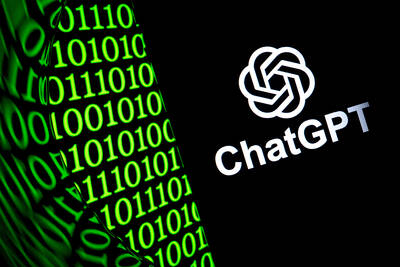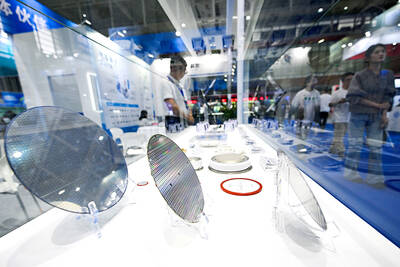Taishin Financial Holding Co (台新金控) expects loan growth to continue this quarter, but at a slower pace than last quarter as ongoing global economic uncertainty merits caution, senior executives told an investors’ conference yesterday.
The conglomerate offered its conservative guidance for the fourth quarter after net profits grew 5.7 percent during the July-to-September period to NT$4.93 billion (US$168.3 million), thanks to stronger sales of wealth management products, better investment returns, more efficient trading and increased exposure to China, Taishin Financial chief financial officer Welch Lin (林維俊) said.
Cumulative income for the first nine months rose to a three-year high of NT$8.6 billion, or earnings of NT$1.1 per share, an increase of 15.1 percent from the same period last year, Lin said.
“Looking forward, secured and unsecured lending operations are likely to stay flat in the current quarter from the third quarter, and so is corporate lending,” Lin said.
Loans to small and medium-sized enterprises may expand sequentially by 5 percent and underwriting operations by 15 percent, while wealth management may decline 5 percent in the fourth quarter because of a high base, Lin added.
Wealth management business, including insurance brokerage, generated NT$1.31 billion in net fee income last quarter, up 9.4 percent from the second quarter, the group’s financial report showed.
Bancassurance accounted for 70 percent, while mutual funds made up the remaining 30 percent, Taishin retail banking executive Oliver Shang (尚瑞強) said.
Sales of insurance policies through Taishin International Bank (台新銀行) peaked in June and July as clients rushed to buy various insurance policies before expense hikes, Shang said.
Taishin Bank, the group’s main source of income, reported NT$2.55 billion in net profits last quarter, a rise of 14 percent from three months earlier, as net interest income grew by 4 percent to NT$3.53 billion, while fee income picked up 6.4 percent to NT$1.96 billion, the report said.
Meanwhile, income from investment and trading operations surged 78.6 percent sequentially to NT$585 million, as the bank made gains on its financial assets, Lin said.
Net interest margin held steady at 1.44 percent at the end of September from June, while the overall interest spread narrowed from 2.04 percent to 2.01 percent, the report showed.
However, foreign currency exchanges saw the spread widen to 1.53 percent in the third quarter from 1.32 percent in the second quarter, the report said.
Taishin Bank plans to set aside an extra NT$300 million in provision by the end of the year to raise its bad loan reserve ratio from 0.97 percent to 1 percent of Tier 1 loans, Lin said.
Meanwhile, Taishin Financial, which inked a deal in August to buy the local unit of New York Life Insurance Co for NT$100 million, aims to file formal acquisition applications with authorities by the end of the month, Taihsin Financial president Joseph Jao (饒世湛) said.
The acquisition may not be a burden the conglomerate’s finances given the limited expense involved, Jao said.
Taishin Financial shares edged up 0.96 percent to NT$10.55 yesterday, outpacing the TAIEX’s 0.71 percent growth, Taiwan Stock Exchange data showed.

OpenAI has warned US lawmakers that its Chinese rival DeepSeek (深度求索) is using unfair and increasingly sophisticated methods to extract results from leading US artificial intelligence (AI) models to train the next generation of its breakthrough R1 chatbot, a memo reviewed by Bloomberg News showed. In the memo, sent on Thursday to the US House of Representatives Select Committee on China, OpenAI said that DeepSeek had used so-called distillation techniques as part of “ongoing efforts to free-ride on the capabilities developed by OpenAI and other US frontier labs.” The company said it had detected “new, obfuscated methods” designed to evade OpenAI’s defenses

NEW IMPORTS: Car dealer PG Union Corp said it would consider introducing US-made models such as the Jeep Grand Cherokee and Stellantis’ RAM 1500 to Taiwan Tesla Taiwan yesterday said that it does not plan to cut its car prices in the wake of Washington and Taipei signing the Agreement on Reciprocal Trade on Thursday to eliminate tariffs on US-made cars. On the other hand, Mercedes-Benz Taiwan said it is planning to lower the price of its five models imported from the US after the zero tariff comes into effect. Tesla in a statement said it has no plan to adjust the prices of the US-made Model 3, Model S and Model X as tariffs are not the only factor the automaker uses to determine pricing policies. Tesla said

China’s top chipmaker has warned that breakaway spending on artificial intelligence (AI) chips is bringing forward years of future demand, raising the risk that some data centers could sit idle. “Companies would love to build 10 years’ worth of data center capacity within one or two years,” Semiconductor Manufacturing International Corp (SMIC, 中芯) cochief executive officer Zhao Haijun (趙海軍) said yesterday on a call with analysts. “As for what exactly these data centers will do, that hasn’t been fully thought through.” Moody’s Ratings projects that AI-related infrastructure investment would exceed US$3 trillion over the next five years, as developers pour eye-watering sums

Australian singer Kylie Minogue says “nothing compares” to performing live, but becoming an international wine magnate in under six years has been quite a thrill for the Spinning Around star. Minogue launched her first own-label wine in 2020 in partnership with celebrity drinks expert Paul Schaafsma, starting with a basic rose but quickly expanding to include sparkling, no-alcohol and premium rose offerings. The actress and singer has since wracked up sales of around 25 million bottles, with her carefully branded products pitched at low-to mid-range prices in dozens of countries. Britain, Australia and the United States are the biggest markets. “Nothing compares to performing